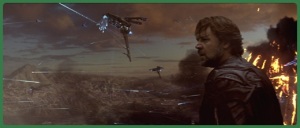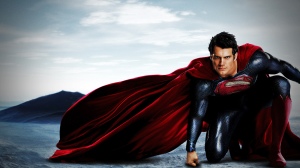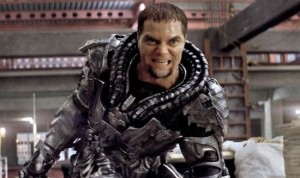Zack Snyder is not the man you go to if you need vision or originality. I say that with all due respect – I like a lot of his previous work, some of it much more than do others. But I would not make the mistake of considering him a visionary. I very much enjoyed his 300, but one must recognise that was a house built on Robert Rodriguez‘s foundations – what Rodriguez honed and perfected for Sin City, Snyder copied and adapted for 300. I like Watchmen, I like it much more than many Watchmen fans do. I think that simply treating the graphic novel as a storyboard was not only smart but the right thing to do[1], and I think that Snyder was the right man for that job: putting someone else’s vision on screen appears to be his strong suit. Even Sucker Punch, if you can ignore the horrendous, borderline misogynist objectification of the ‘characters’, has its merits, but originality is not one of them. The film is a study in imitation, different styles and genres thrown together by what by then had become Snyder’s trademark ‘live action comic book’ style[2]. So I do rate Snyder, I think that he has a specific skill set and that when he does what he does, he probably does it better than anyone else. But what he does is not originality. What he does is not vision. And that’s what Man Of Steel required.
Neither do I blame Snyder wholly for the mess that resulted. DC Comics clearly looks across the aisle at Marvel, sees what they have created and desperately want the same. This much is clear from their decision to make a Justice League movie, and to try to shoehorn this vision of Superman and Christian Bale as Nolan’s Batman[3] into it, regardless of how terrible an idea that is. So they are trying to emulate Marvel’s success, rather than working on their own properties, but they are going about it the wrong way. Marvel created Marvel Studios, crucially allowing one man, Kevin Fiege, to act as producer to oversee the creation of their universe – this allows them to go to different directors, to get unique vision for each character, but to protect the various properties and to keep the overall feel of the movies intact. DC are still dependant on other studios, outside producers, to get their movies to screen, and one of those producers famously has no feel for the character and no hesitation in sticking his boot in at the story stage. This, together with their lack of faith in their own property, combined with a director who can imitate but not create his own vision, resulted in the Man Of Steel.
The movie opens on Krypton – immediately there are problems here, because this is unnecessary for the plot as designed by Goyer. How many alien invasion movies start on the planet of the invader? All the Krypton sequence serves to do in story terms is to show us a bunch of exposition that we’re going to be told in about 15 minutes anyway. But this must be what they thought we would be expecting[4] – exactly what Richard Donner did. The difference there was that Donner was trying to show us the very obvious Christ parallels[5] with his character, and was giving the audience something they had seldom seen before – a whole new world. Spin on to 2013, we’ve all seen new worlds now, and we’ve already seen much of what Snyder tries to show us here. So we get the flying lizards from Avatar, the drop ships from Star Wars – Attack of the Clones, and perplexingly what everyone refers to as a codex but which appears to be a monkey skull.
More mysterious still is why Jor-El decided he needed to steal the codex in the first place and why he thought the best place to hide it was in his son’s genetic code. You might think few would think to look for it there, albeit Zod seems to be one of them, but honestly from Jor-El’s perspective what was the point? In terms of the story it gives Zod an animus against Superman but this does nothing to explain Jor-El’s motivation in the first place. This kind of sloppy loose-end should have been taken care of at the scripting stage, it should never make its way on screen. The whole sorry business appears to be an excuse to give Russell Crowe something to do.
We then get to meet our villain, General Zod. I like Michael Shannon, I have no doubt he has a great future, and he definitely has the look of a great villain. But then he opens his mouth and all that vanishes. Shannon doesn’t have the voice to match his look – at least, not yet. A face that craggy, that brutal, deserves a voice like Vin Diesel‘s, Clancy Brown‘s or Michael Wincott‘s and Shannon just doesn’t cut it.
The role of Zod is also woefully underwritten – where most great villains gain character and pathos from their backstory and their motivation, the film goes to great lengths to point out that Zod is this way simply because he was bred to be this way. All the talk of wanting to protect his people, rebuild his civilisation, is fatally undermined by the fact that Zod simply has no choice. He becomes wholly one-dimensional. This, together with the superb production design, has the odd effect that he makes a better action figure than he is a character.
The next phase of the film is Clark as a wandering vagabond/do-gooder. This is the most Nolanesque portion of the film – attempts at, if not realism, verisimilitude. The problem is that these sequences have no direction – I said about Batman Begins that it showed us exactly how you go from the boy crying on the street to the man in the cowl flying past the camera. There is none of that arrow-straight plot progression here, the story simply meanders through until we find Clark and Lois both at the North Pole, independently and co-incidentally. Co-incidence is possibly the laziest of writing sins, yet here it is. Lois is given nothing to do in the story, instead of showing us, she has to tell us that she is a Pulitzer prize-winning journalist[6] and has to demonstrate that she’s tough and able to play with the boys by talking about dicks. This sequence just makes her appear arrogant, lazy enough to rest on her laurels, and above all, nasty and tacky. Nasty and tacky is not what you should be thinking when seeing Amy Adams in a role.
We then have a series of flashbacks to Clark[8] growing up in Smallville. These do nothing to assist in understanding the plot or the character and their placement appears to be random. Non-linear storytelling is a hallmark of Chris Nolan, and he does it beautifully[7], but mishandled it can be at best irritating and at worst distracting. And it is mishandled here.
Beyond that, the content of the flashbacks does little to drive or develop the characters – worst off is Jonathan Kent, who in this film is not the moral centre who drives Clark to want to be a better man, but is a small-minded, timid misanthrope. He encourages Clark to let people die rather than reveal his secret – the antithesis of everything Superman stands for – then dies himself, pointlessly, in a scene intended to establish conflict in Clark but which only serves to make Clark appear stupid and weak.
We then get the arrival of the aliens. In our ‘alien invasion’ movie, this should have been the standout scene – remember the ship cruising over the White House in Independence Day? Here, all we get is the message from the aliens being broadcast on every TV on the planet – again Snyder imitates, rather than innovates, his way through. Once the aliens arrive, aside from the shocked faces at the Daily Planet, the only involvement appears to be from Christopher Meloni and his few military types. A film which overtly draws parallels with the previous Superman films begs the question – where is the equivalent of Terrence Stamp’s confrontation with the President?[9] For that matter, where is the President? If this is the single most important event in human history, how is it he (or she) found something more important to do? Again – the film had a strong central premise, it just lost faith in it and ends up weaker for it.
Clark returns to the ‘fortress of solitude’[10] and we get what must be my least favourite scene of the film – Clark learning to fly. Why? Why has he not been able to before? Is it the suit that allows him to fly? The cape? The movie simply does not explain what this is about. Instead, we are presented with what they must have assumed we would expect to see – Clark learning to fly – without any context or meaning. Again – imitation of every other Superman movie we’ve ever seen, and it jars where it wanted to soar.
Clark then confronts the Kryptonians, heralding the end of the story and the beginning of the punching. This is unfortunate, given that the story had failed to resolve any of the things you might expect – character arcs for any of the characters, tying up of any of the ‘issues’ raised, etc. Instead we get 20 minutes of Clark and the Kryptonians punching themselves and each other first all through a small town, then through a major city (which looks surprisingly like New York). Where have we seen that before? In the hope of emulating the box office of The Avengers, Snyder simply emulates its climax. This simply does not work, and the reason is obvious – one cannot have that much carnage in a movie that po-faced. In The Avengers, the destruction was best described as A-Team violence – lots of property damage, but you know that every car that exploded and rolled over had the driver climb out through the window rubbing his head. It was pure comic-book fun. But Man of Steel wants us to take it seriously, and taking that kind of destruction seriously is horrifying. As a result is Snyder is torn between accusations of the massive body-count (which jars with the Superman we all know and love and stops us having any fun with the movie) and the inescapable conclusion that he just wanted to do what The Avengers had done before.
Problems also beset the relationship between Lois and Clark. Without establishing any chemistry between them we are simply shown Lois kiss Superman out of the blue, and again the effect is jarring.
Jor-El then shows Lois how to defeat the Kryptonians – no explanation is offered as to why he couldn’t have told Clark this over an hour ago – so she and Meloni dispose of the vast majority of the villains. This smacks of giving Lois something to do, and again is suggestive of poor storytelling. In addition, where the nuke in The Avengers gave us the emotional release of a eucatastrophe[11], here we are left with Zod still tearing down buildings, so we don’t even get that feeling of relief.
Instead we have the final battle of Superman vs Zod. The culmination of this is Zod trying to kill a family huddled in a corner with his super-heat-vision. Superman then does the least Superman thing he can – he kills Zod, then cries about it. This appears to be an attempt at showing superheroic angst[12] but here it just looks like a childish tantrum.
I have noted the many positive aspects of the movie, but when the filmmakers lost faith in their own premise, when Snyder simply tried to copy every other movie he could rather than demonstrating his own vision, all of that potential was squandered. The result was a cynical, disjointed, derivative mess, and in spite of myself I still want it to be a better movie than it was.
——————————————————-
[1] I even like the changes to the conclusion of the story, but that is a subject for another blog.
[2] Even the overall ‘message’, one individual creating a fantasy of the events of her life in order to come to terms with the sacrifice she will have to make, is done much better by Del Toro’s Pan’s Labyrinth.
[3] Allegedly
[4] And exactly what Nolan didn’t do in Batman Begins.
[5] I know Siegel and Shuster would argue for the Moses parallel, but Superman is so obviously a Christ figure that just rings hollow.
[6] Has any journalist in any movie not won the Pulitzer Prize?
[7] Watch The Prestige and witness a true virtuoso use his various flashbacks to drive and give shape to the story. Then compare with what Snyder did here.
[8] The way they refer to Jor and Kal as if they are just first names, with El being the surname, annoyed me to no end. That may just be me. But it sounded wrong.
[9] Can you think of a single moment in this movie that could possibly rival the popularity of that scene?
[10] Another term never used in the movie
[11] A very important term in this kind of epic storytelling, and one I plan to blog about later
[12] If you want to see angst in a superhero, look at Christian Bale’s face as Rachel Dawes dismisses him in the hotel in Batman Begins, or in fact at the end when she explains why she can’t be with him.







